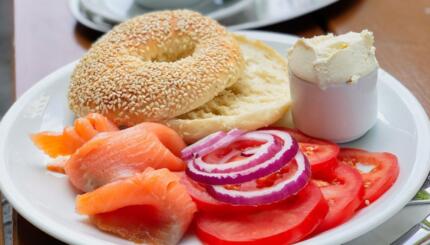A colleague recently voiced frustration that “mitzvah” has been mis-translated as “good deed” instead of “commandment.” I agreed, griping in tandem. And then…this happened: In the Davis Academy Middle School Sukkah, we fulfilled a series of commandments, and it felt like such a good deed! What a joy for the students who signed up to host and entertain participants in a Jewish Family & Career Services program for adults with developmental disabilities.
We started out by having our Jewish Life Leadership students understand what the program would entail for them and for their classmates. Then, they agreed to advertise it in one of our all-school Tefillah programs. Sign up sheets went up and kids from 6th, 7th, and 8th grade signed their names, checking with multiple teachers to make sure that they could miss classes during the time of the activity.
They prepared themselves by asking questions and gathering at 15 minutes early on the day our guests were slated to arrive. They asked such important, thoughtful, kind questions:
“What kind of disabilities will they have?”
“What if they’re gluten-free?”
“Can I eat my lunch while they’re eating?”
I asked the students if they could name all of the mitzvot – commandments – that they were doing. The most interesting question that came up was about bikur cholim, visiting the sick. A student asked if we were visiting the sick, because our guests have disabilities. In our open group discussion, we found that while our guests may have certain limitations, they’re not actually sick and in need of healing. Thus, we settled on building community, kehillah, one of our school’s core values, in addition to the mitzvot of welcoming guests and welcoming guests into their sukkah.
When our guests arrived, students were eager to welcome them, peeking out of the front door of the school, bopping around with smiles on their faces, and leaping to introduce themselves to their new friends. Students offered to fill out their new friends’ guest name tags, and went in pairs downstairs to lunch. It was a little too soggy out at the sukkah, due to pretty gloomy weather, so we ate lunch in our cafeteria alongside our entire 6th grade. Escorted through our lunch line (on pizza day!), our guests filled their plates with food and filled their tables with conversation. Some residents were less verbal and some were more loquacious, but every Davis Academy student asked and answered questions, telling stories and learning about their new friends.
After lunch, and clearing off the tables, our students, joined by an 8th grade Hebrew class, escorted our guests outside to our sukkah. Luckily, the skies were clearing, and as a group, we were able to stand in the sukkah, learn a bit about its construction, and learn and follow along with the blessings for shaking the and lulav. Many, if not all, of our guests were not Jewish, and had never been exposed to this holiday, and many were tickled by the exposed sky through the sukkah’s schach, in this case, a bamboo roof.
At the end of the program, students and guests hugged and smiled, posed for pictures, and bid each other farewell. Guests chattered happily with their staff members as they left for the next part of their day, and our students went back to class with their hearts full and eyes gleaming with happiness. They all felt so good for what they had been able to do, and that through these commandments, they had done a good deed.



